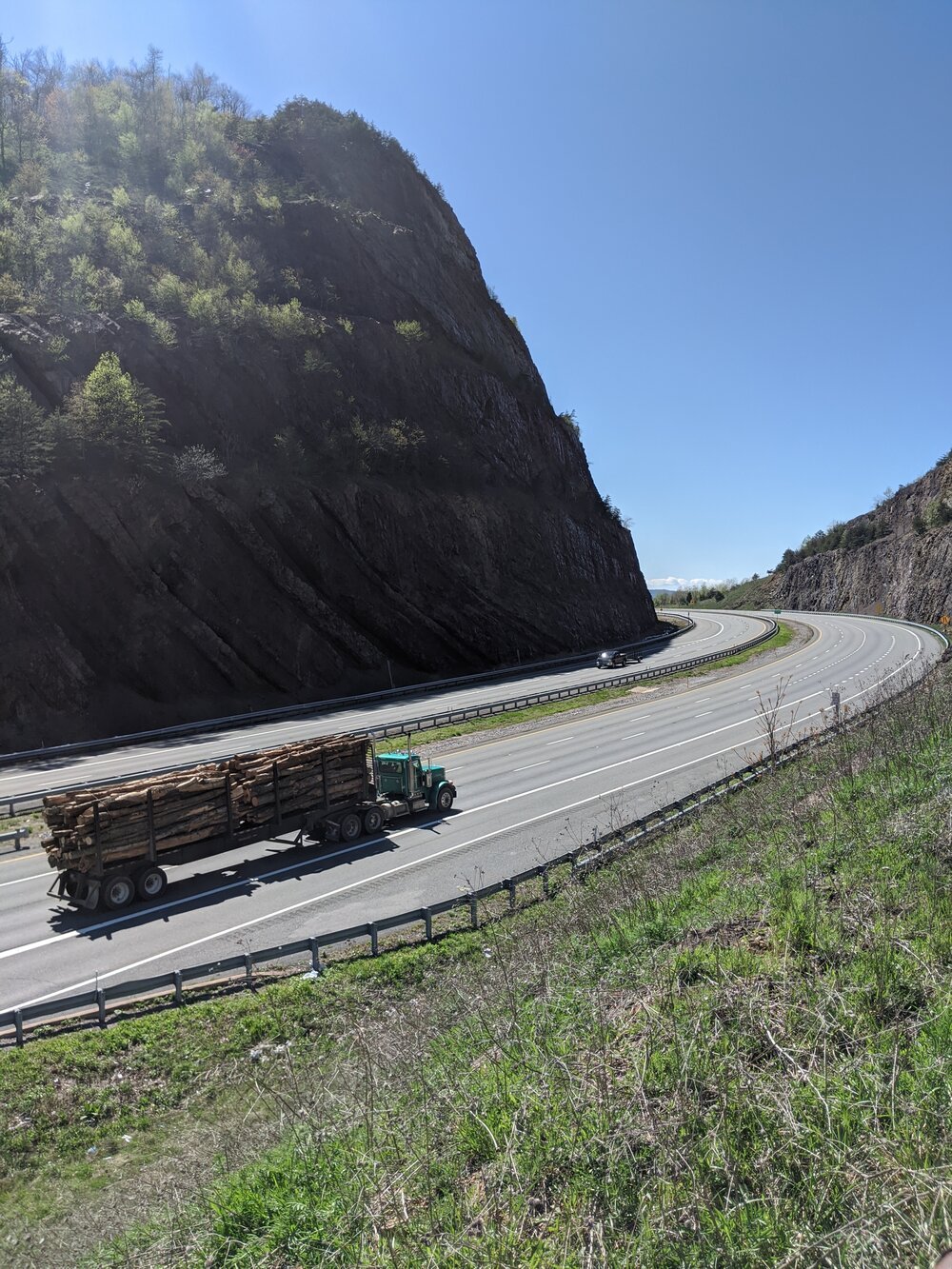America the Beautiful (?)
By: Fushcia Hoover, PhD
Image: Logging truck driving through the Maryland Sideling Hill Road Cut (I-68 and U.S. 40). Considered one of the best rock exposures in the Northeast, its elevation is 2,311 ft (704 m).
As I drove from southern Ohio to Maryland, with Beyonce’s Freedom playing in the background, I became overcome with emotion. If you’ve ever driven across the Appalachian mountains, it is quite the surreal experience, particularly for someone who grew up in central MN (it’s flat). The bluffs of Wisconsin or Lake Superior in Duluth were enough to wow me, but they paled in comparison to driving through the breathtaking Appalachian terrain, it was all I could do to keep my eyes on the road. While marveling at the immense beauty this country holds brought a new found wonder for natural spaces, my research brought the beauty of America’s landscape into stark contrast with the environmental racism and injustice that pervade those exact spaces.
“While tracking the sudden yellow-orange flash of an Oriole, we must simultaneously be aware of who is tracking us. ”
America’s nostalgia with road trips and exploration are embedded into our culture, film and stories (e.g., National Lampoon’s Vacation, Are We There Yet? or Wild ). My relationship with long distance driving began when my sister started school at Beloit College, a five hour drive from our home in St. Paul. I often extended my trips to drop her off or pick her up to visit, party or on a rare occasion attend her sociology classes. I once helped a friend drive 9 hours to begin her master’s program, only to begin my graduate studies at that same university the following year. When I moved to Chicago, my drive to visit home became 7 hours with monthly 2 hour road trips back to my uni for committee meetings. Subsequently, my first postdoc in Cincinnati, OH extended that drive home to 12 hours.
In addition to driving, I have always loved being outside. As a kid I attended YMCA day camps, week long sleep away camps, and was usually on my bicycle, splashing in a lake or climbing a tree. With a few exceptions, I've never felt unsafe or at risk. Driving I avoid gas stations in small towns, staying close to the highway and not spending unnecessary time at rest stops, renting red or sports cars and never going more than 5 mph above the speed limit. I held on to the misbelief that this and my gender protected me, a belief amplified by my light skin. It wasn’t until the wrongful stop, arrest and murder of Sandra Bland, followed years later by a solo drive through Kentucky that I fully absorbed the risk of exploring the world as a Black woman alone.
The freedom to explore or even exist in nature as an observer or participant is a restricted and contentious act when you are Black. Environmental racism permeates not just the air we breathe or the trees we (don’t) see, but our freedom to enjoy them. Whether we are birding, cycling, or going for a run, environmental racism stops our exploration and robs us of our joy while reminding us we are not always welcome. While tracking the sudden yellow-orange flash of an Oriole, we must simultaneously be aware of who is tracking us.
Perhaps I have just been naive. More likely, I desperately wanted to reject the idea of being restricted by racism. Is it so bad that I wanted to hold on to hope that I could explore the great outdoors with a carefree and unencumbered eye of fascination opposed to the ugly backdrop of surveillance?
It was with these thoughts, after visiting my mom in Minnesota where my hometown rose up in defiance over the murder of Mr. George Floyd, I mourned the loss of privilege to see America’s beauty and the limits of our freedom when you are Black (or disabled or othered). For me, the immense beauty of my country will always be eclipsed by the environmental racism and injustice that deny us the space to explore, entertain our curiosity, and stop at that ice cream shop because the town is too unknown, too risky, too white. America is beautiful when your sky is clean, the soils uncontaminated and the air is sweet. and we deserve to experience America’s beauty just like this...we built it after all.
Resources
To learn more about the ways Black Americans have navigated long-distance travel in the past or organizations that support Black and brown exploration, here’s a short list to get you started.
Books
The Negro Motorist Greenbook (additional resources listed at the bottom of article)
Organizations
Four Black Environmental Orgs to Know article (feat. Outdoor Afro, Philadelphia Urban Creators, Urban Habitat, Green Worker Cooperatives)
Blacks in Green (Chicago)

